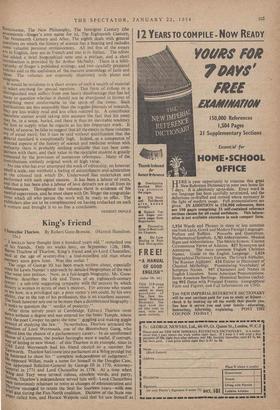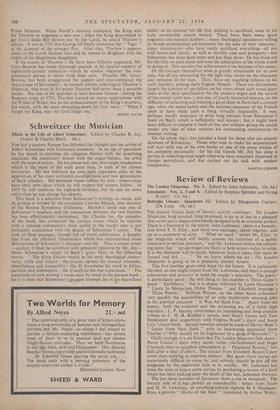King's Friend
1 SHOULD have thought him a hundred years old," remarked one of his friends. Only six weeks later, on September 12th, 1806,
,, ron Thurlow of Thurlow, King's friend and ex-Lord Chancellor, 'led at the age of seventy-five : a foul-mouthed old man whose Memory soon grew faint. Was this unfair ?
The reign of George Ill has been much written about, especially since Sir Lewis Namier's approach by detailed biographies of the men 1110 went into politics. Now, in a full-length biography, Mr. Gore- rowne describes the Life and Times of an eighteenth-century `1\‘'Yer : a sub-title suggesting sympathy with the process by which history is written in terms of men's motives. For anyone who wants to sec how, in a privileged age, a poor rector's son could, by his own .1°,11ItY, rise to the top of his profession, this is an excellent account. The book however sets out to be more than a disinterested biography : It seeks to question the " verdict of posterity." After three unruly years at Cambridge, Edward Thurlow went down without a degree and was entered for the Inner Temple, where With the poet Cowper he, spent the time " giggling and making giggle instead of studying the law." Nevertheless, Thurlow attracted the 'Mention of Lord Weymouth, one of the Bloomsbury Gang, who 11,ffered him the chance of a parliamentary career, In an unreformed way of Commons, the pocket boroughs were a useful, if corrupt, WrItY of letting in new blood : of this Thurlow is an example, since in 1,cl165 Lord Weymouth had his friend elected as a member for ,Mworth. Thurlow had come into parliament as a Whig protégé but _ke hastened to show his " complete independence of judgement."
Prime Minister. When North's ministry collapsed, the King sent for Thurlow to negotiate a new one ; when the King determined to get Fox's India Bill thrown out by the Lords, he asked Thurlow's advice. It was in 1792 that George Ill finally dismissed the " Tiger " at the demand of the younger Pitt. After that, Thurlow's appear- ances in the Lords became rare and he retired to Brighton with the eldest of his illegitimate daughters.
If the events of Thurlow's life have been hitherto neglected, Mr. Gore-Browne has made thorough amends in his careful mastery of eighteenth-century materials—which he quotes wherever the con- temporary phrase is more vivid than ours. Possibly Mr. Gore- Browne has both exaggerated the neglect and over-estimated the importance of his subject : he himself admits, referring to Thurlow's dismissal, that even in his prime Thurlow had never been a possible leader. But one of his speeches at least became famous : during the Regency crisis of 1793, Thurlow carried on secret negotiations with the Prince of Wales, but on the announcement of the King's recovery, his words, with the tears streaming down his face, were : "When I forget my King, may. my God forget me." MERRY JACOB



































 Previous page
Previous page